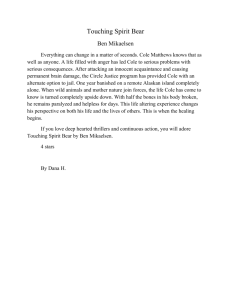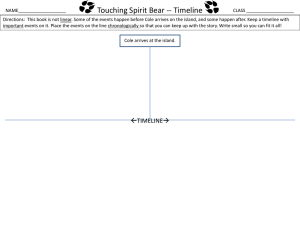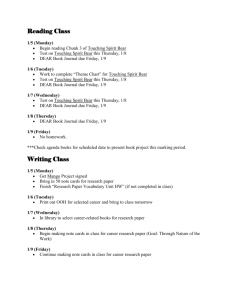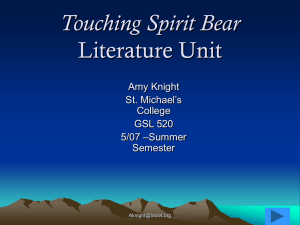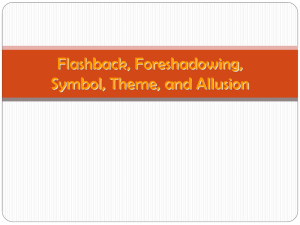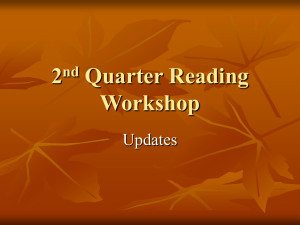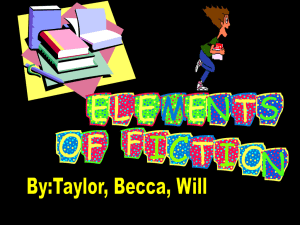Touching Spirit Bear
advertisement
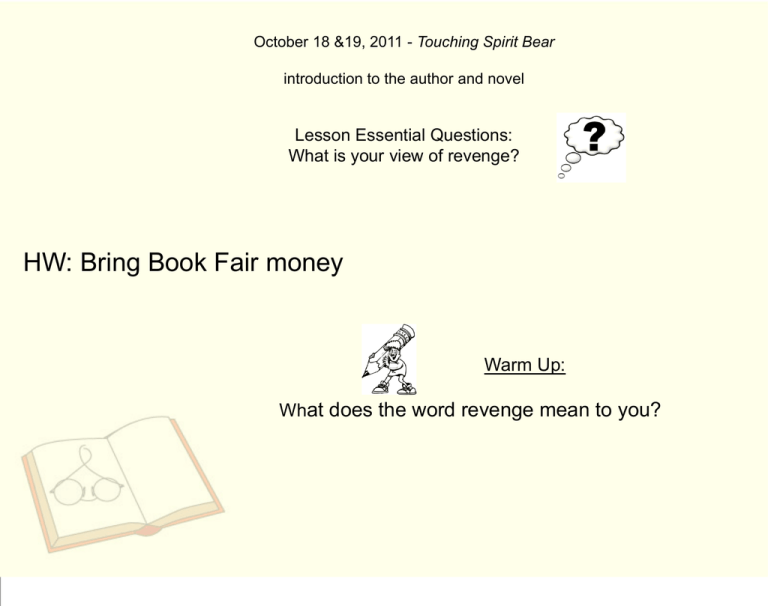
October 18 &19, 2011 - Touching Spirit Bear introduction to the author and novel Lesson Essential Questions: What is your view of revenge? HW: Bring Book Fair money Warm Up: What does the word revenge mean to you? Guided Reading and Group Reading of "Revenge“ Take a few minutes to review your answers. Socratic Seminar on "Revenge" October 19, 2011 LEQ: How did Ben Mikaelsen's past influence his book Touching Spirit Bear? Warm Up: What kind of experiences might be helpful to an author trying to write a book like Touching Spirit Bear? Wednesday: Turn to the back cover of your copy of Touching Spirit Bear. Read the story synopsis and in your notes and answer the following question"Will the attack of the Spirit Bear destroy Cole's life or save his soul?" Elaborate on why you made the prediction you did. Getting to know the author: Ben Mikaelsen http://www.benmikaelsen.com/about_ben.html PrefaceSentencing Circles, Restorative Justice, Circle Justice, whatever people wish to call it, boils down to the same thing: Healing. For years, modern civilizations have insisted on treating aberrant (abnormal) and destructive behavior in society with punishment, depending on fear as a deterrent (prevention). Sentencing Circles use a completely different paradigm. If we think of all people as fellow travelers on a wonderful but frightening journey through life, it is easier to look at destructive behavior as a sign that one of those travelers has become lost or confused on their journey. It is important to realize that under the right conditions, any one of us could become that lost traveler. What is important is to find a way to return a lost traveler to a path that will allow them to continue on a wholesome and wonderful journey. That path is one of healing. My own past found me as one of those lost travelers. In retrospect, I would have given anything to have been introduced to Sentencing Circles early on during my “being lost.” It would have changed my life as I knew it to have read a book such as Touching Spirit Bear or had a chance to have a novel study such as this one to help me work through my own anger. A lifetime of struggle brought to me an understanding and awareness of the lessons defined so wonderfully on the pages ahead. For me the catalyst that finally brought me to the writing of Touching Spirit Bear was the day when I turned the TV on and I heard those ominous words, “This morning in Littleton, Colorado, at a high school called Columbine.” And, of course, that was the morning when two high school boys in the United States, Eric Harris and Dylan Klebold, who had been bullied themselves, became lost on their journey. That day, they killed twelve students and one teacher, and wounded twenty-three other students before committing suicide themselves. All of this because of mankind’s ability to be cruel and because two boys could not find a way to deal with their anger. It is my sincere and profound wish that Touching Spirit Bear and this novel study become useful tools to help students discover tolerance, forgiveness and kindness. I hope they will help students who are feeling lost to find their way back to a path where they can once again join that wonderful journey called life. Fair thee well, fellow travelers, Ben Mikaelsen Who knows what the "golden rule" is? This rule requires that we treat others as we would like to be treated and can be found in the teachings of many cultures and religions of the world. One of the Ten Commandments (believed to have been given by God to Moses) is “love thy neighbour as yourself.” The Bible reports Jesus as saying “Do unto others as you would have them do unto you.” Muhammad requires followers to “Hurt no one so that no one may hurt you.” The teaching of Confucius states “What you do not wish upon yourself, extend not to others.” Guided reading of "What You Do When No One is Around" What You Do When No One Is Around Laws let us know what is considered right and wrong by society, but should we rely on laws and the consequences for breaking them to guide our behavior? Aboriginal societies did not traditionally rely on laws imposed by authority and punishments for breaking those laws to guide people’s behavior. There is great diversity among Aboriginal peoples but there are some common elements. Customary Aboriginal laws are not something that people are forced to obey or face punishment. Customary laws are made to help people know and live by their community’s ideas about duty and responsibility. The “good life” or a “good mind” often has the same meaning as law. Customary Aboriginal law is all the social mechanisms that teach people from birth to death how to live a good life. This idea was expressed by a Cree Elder when he compared Canadian laws to Aboriginal law and asked “Why do your laws…speak only about what people should do? Why don’t your laws speak to people about what they should be?” The Cree concept of Miyo-wicetowin requires Cree peoples to conduct themselves in a way that creates good in all relationships. Every person must find for themselves the “good mind” that allows them to know Aboriginal law and comply with it. Reaching the “good mind” requires an understanding of the wisdom that the community has gained through the ages. Because this wisdom is not written down anywhere, this knowledge is often gained from Elders. The role of Elders sometimes varies but generally consists of helping people, individually and collectively, to gain knowledge of the history, traditions, customs, values and beliefs of the community. They are respected for their wisdom and experience and being able to advise people about what to do in difficult situations. In Aboriginal law there is a respect for individual independence. People are encouraged to make their own decisions and accept responsibility for them even at an early age. Stories are used because the listener is free to understand in their own way and act on it or not. Discussion questions for What You Do When No One Is Around 1. What would you do or not do if you could get away with it? Why would you do it or not do it? 2. Can you think of situations where it would be right to break the law? 3. What are some of the benefits of relying on the law to tell you how to act? 4. What are some of the drawbacks of relying on the law to tell you how to act? What are some common laws / rules that we deal with everyday? So what might happen if we had no traffic laws? No traffic lights? No stop signs? The Drachten Traffic Experiment Well, in the Dutch town of Drachten in the Netherland, they removed many of the traffic lights. Before the traffic lights were removed there was a road accident death every three years but there have been none since the removal started eight years ago in 2003. The traffic planner, Hans Monderman, explains how having no lights actually makes it safer by noting that “it shifts the emphasis away from the Government taking the risk, to the driver being responsible for his or her own risk.” Check it out! http://www.youtube.com/watch?v=4G6rHOEHt4Y
